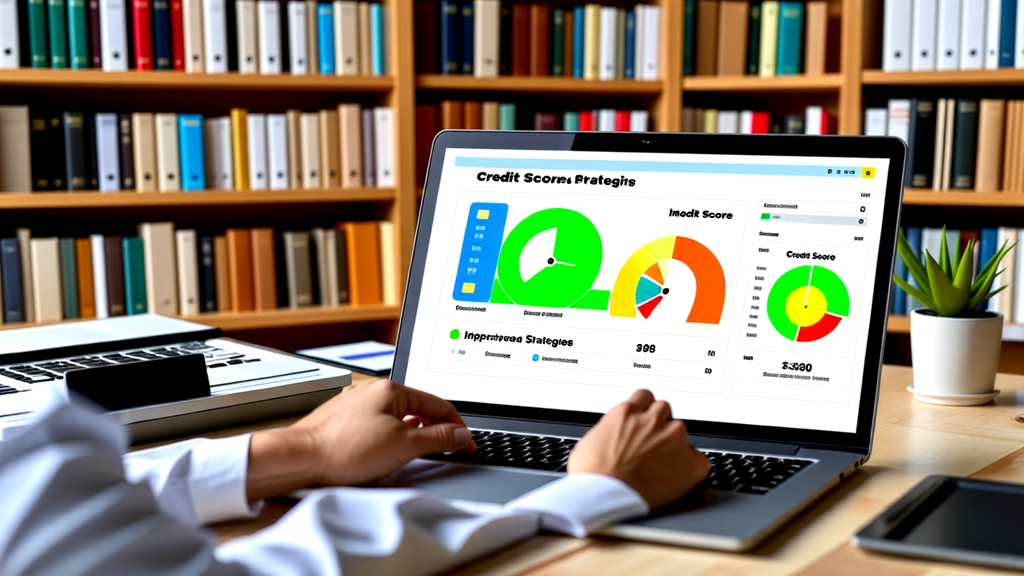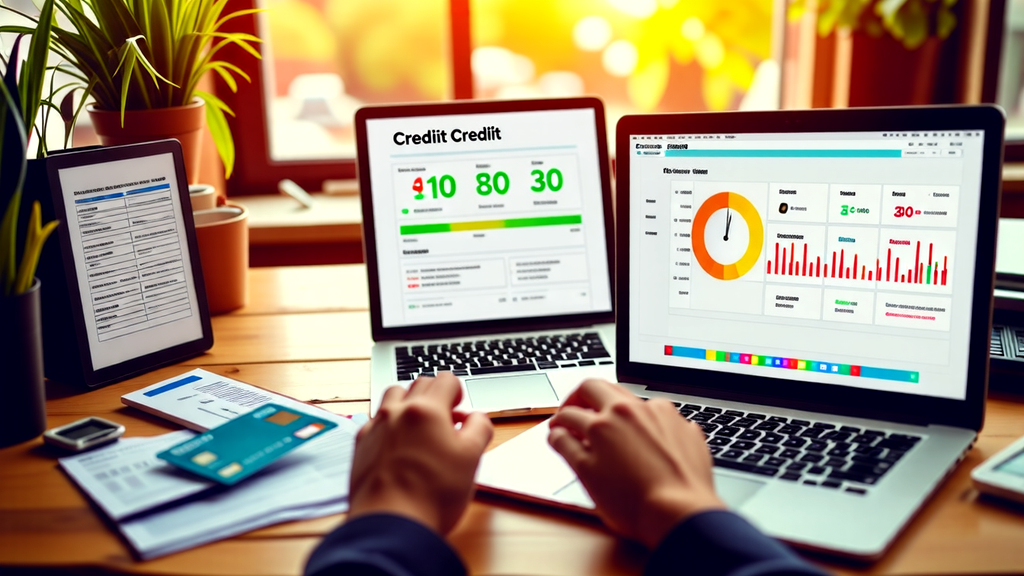I’ve been where you are, staring at my credit score and wondering, “How on earth can I give this number a serious lift?” Believe me, you’re not alone in this financial fitness marathon. Improving your score isn’t just about unlocking the secrets to a magical financial kingdom; it’s about making smart, consistent choices.
For starters, paying loans on time is like hitting the gym for your credit health. It’s a no-brainer but easy to slip up on. Then, there’s the art of balancing how much you owe on your credit cards. Getting too cozy with your credit limit is a surefire way to make your score sweat. And let’s not forget the old-timers in the game – those long-standing accounts that add years to your credit’s lifespan.
But here’s a kicker, checking your report for errors is akin to spotting missteps in your fitness routine. Correcting them? It’s as satisfying as smashing a personal best. So, let’s lace up and get your credit score racing to its peak performance. After all, it’s not just a number; it’s a reflection of your financial IQ and, by extension, your financial freedom.

The Importance of a Good Credit Score
I’ve found that one of the fastest tracks to boosting your credit score isn’t always in the big gestures but in the nuances of your daily financial decisions. For instance, adjusting your credit utilization lower not only shows you’re not overly reliant on debt but can be a quick win for your score. And did you know that becoming an authorized user on a family member’s account could potentially add points to your score? It’s like borrowing someone else’s financial good reputation for a bit. Just make sure they’re responsible with their money! Trust me, managing your credit isn’t just about avoiding bad credit; it’s about strategically nudging your numbers up, one smart move at a time.
How Credit Scores Work: A Breakdown
Diving into the nuances of improving credit scores, myths often muddy the waters. For example, many believe that carrying a balance on their credit card enhances their score. In reality, it’s the opposite. Keeping balances low and paying off monthly statements in full optimizes your credit card utilization rate, a critical factor in your score. Another misconception is the benefit of closing unused credit accounts. Instead of helping, it could actually shorten your credit history and bump up your utilization ratio, which might ding your score. I always chuckle when I hear these myths—clearly, there’s a lot of fiction in the personal-finance arena.

The Impact of Late Payments on Credit Scores
Reflecting on the repercussions of late payments reveals a direct hit to your credit score. Picture this: each missed payment is a red flag to lenders, signaling potential risk. Here’s a quick list to steer clear in the pursuit of improving credit scores:
Automate payments to never miss a due date.
Monitor individual card utilization to keep it balanced.
Regularly review accounts for any inaccuracies.
Educate yourself on credit score myths to avoid common pitfalls.
Embrace the discipline of periodic personal-finance check-ins.
Just like maintaining a garden, nurturing your credit requires regular attention and care.
Responsible Credit Card Usage and Your Credit Score
Keeping your credit utilization below 30% is a golden rule I swear by. Think of your credit like a cake; you don’t want to eat too much to avoid a stomachache, right? So, if my limit is $1,000, I aim to spend less than $300. It keeps my financialiq sharp and my wallet happy. Paying more than the minimum on my credit card each month is another trick up my sleeve. It’s like hitting two birds with one stone—avoiding hefty interest and improving my credit score.
The Truth about Credit Card Utilization
So, about managing credit card utilization, here’s a nugget of wisdom: never let it creep up on you. I’ve learned it’s not just about spending; it’s about strategic spending. For those of us aiming to polish our financialiq, slashing credit card balances is akin to a financial detox. It’s not just about the thrill of swiping; it’s about the art of balance. I once thought closing old accounts would help my credit score soar. I was wrong. It’s a common trap, one of many credit score myths we fall for. I’ve shared my insights on how refinancing your home loan can be a smart financial move, which can indirectly influence your credit health by improving your personal-finance situation. Remember, every swipe, every payment, and every account plays a part in your financial story.

The 30% Credit Utilization Rule Explained
Diving into the explanation of the 30% rule for credit utilization is like uncovering a secret to improving credit scores. You see, it’s pretty straightforward—don’t bite off more than you can chew. If you’ve got a $1,000 limit on your credit card, keep that balance under $300. Why, you ask?
It signals to lenders you’re not drowning in debt.
Your FICO credit scores could see a nice bump.
It reflects well on your personal-finance habits.
You dodge the high-interest trap tied to credit card balances.
It leaves room for unexpected expenses without maxing out credit cards.
Think of it as keeping your financial house in order—not too cluttered, just right.
Debunking Credit Score Myths
Shattering misconceptions about raising credit scores is my aim today. Let’s tackle a few: holding onto credit card debt with the belief it boosts your credit score? False. Actually, clearing your credit card balances monthly shines on your financialIQ. Think closing old accounts aids your score? Another miss. It might just shrink your credit utilization, negatively swaying your numbers. For those curious about FICO scores, they’re the gold standard many lenders use. By the way, I’ve found keeping an eye on my credit report is a fantastic way to spot errors and keep my score climbing.
Myth: Carrying a Balance Improves Your Credit Score
Holding a balance on your credit cards doesn’t do your credit score any favors. Frankly, paying off those balances each month is a better strategy for your financialIQ. It keeps your individual card utilization low and shows lenders you’re a wizard at managing debt. Plus, did you hear about the FICO scores? They’re pretty much the yardstick for measuring your borrowing reputation. I always make sure to check my score regularly; it’s like a financial health check-up. Keeping those credit card balances in check is a surefire way to keep your financialIQ sharp.

Myth: Closing Unused Credit Accounts is Beneficial
Shutting down those dormant accounts, thinking it’ll give your credit score a leg-up? Big oops. That’s a myth that could actually ding your score. By reducing your total available credit, my financialIQ took a hit when I learned this the hard way. My advice? Keep those accounts open but monitor them like a hawk. It’s a balancing act—like trying not to spill your coffee on a bumpy bus ride. And if you’re wrestling with personal-finance decisions, I’ve discovered that keeping an eye on my credit report is like having a financial compass.
The Role of FICO Score in Credit Evaluation
When it comes to the impact of FICO scores on credit evaluations, it’s clear that maintaining a solid score is akin to holding a golden ticket in the financial amusement park. I’ve found that improving credit scores isn’t just about avoiding bad credit; it’s an art form in itself. Regularly checking my score, I make small adjustments, like lowering my individual card utilization, to paint a prettier financial picture. My blueprint for boosting financialIQ? Keeping credit card balances low and mixing up the types of credit I use. Just remember, a good credit score opens doors in the personal-finance arena.
How to Access Your FICO Score for Free
To easily check your FICO score without spending a dime, follow these steps:
Visit your bank’s online portal; many offer free score access to customers.
Sign up for a credit card that includes a free FICO score as a benefit.
Use the official AnnualCreditReport.com for a free yearly report from the three major bureaus.
Look into credit monitoring services that offer free scores and alerts.
Check if any non-profit credit counselors can provide your score at no cost.
This simple approach not only helps in improving credit scores but keeps you informed about your financial standing. Remember, a good credit score is your ticket to favorable financial opportunities.
The Influence of Medical Debt on Credit Scores
The impact medical debt has on FICO scores may surprise you. With recent adjustments, debts under $500 are now excluded from reports, potentially boosting scores. Maintaining a good credit score is pivotal for financial well-being, influencing loan conditions and insurance rates. My focus on financialiq and personal finance has revealed that managing credit cards wisely and keeping individual card utilization low are keys to success. For anyone struggling with bad credit, strategic actions like reviewing credit reports regularly can usher in improvements. In my experience, it’s these mindful habits that lay the groundwork for a solid credit score.
The Importance of Regular Credit Report Review
Acknowledging the necessity of routinely checking your credit report is paramount when it comes to improving credit scores. I’ve found that catching errors early can make a big difference. My mantra? “Know your financial story.” By aligning with this approach, I’ve managed to steer clear of surprises that could hurt my score. A pro tip I swear by is setting calendar reminders for these reviews. It’s like giving your financialiq a workout, keeping it in top shape. For those who juggle multiple credit cards, this habit is golden. It ensures that your individual card utilization stays within a healthy range, positively impacting your credit score. So, let’s not underestimate the ripple effect of this simple yet effective strategy on our personal-finance health. Experian provides a clear explanation on how different inquiries affect your score, which is a must-read for anyone serious about maintaining or improving their credit scores.

Strategies for Building Good Credit
In my hunt for a stellar financialiq, I’ve nailed down a few game-changers for boosting those numbers that lenders love. Paying on time is my golden rule; it keeps my record spotless and trust me, it does wonders for my peace of mind. I always keep an eye on how much of my credit limit I’m using—staying below 30% is my jam. And you know what? I’ve learned the hard way that errors on my report can be sneaky little gremlins, gnawing away at my score. So, grabbing that free report annually isn’t just a to-do, it’s a must-do. Trust me, tackling these steps has put me on a fast track to personal-finance mastery.
Effective Debt Consolidation to Improve Credit Score
Managing multiple debts can feel like trying to juggle knives. So when I stumbled upon the strategy of consolidating debts to manage my finances better, it was a game-changer. Suddenly, those knives turned into feathers. By combining several debts into one, I lowered my interest rates and streamlined my monthly payments. It wasn’t just about making life simpler; this move was a strategic play in improving my financialiq. Keeping my personal-finance in check became less of a battle and more of a strategic game.
How Hard Inquiries Affect Your Credit Score
Exploring the impact of hard inquiries on one’s financial standing reveals a nuanced effect on credit scores. Each hard inquiry might shave off a few points, typically lasting for about two years. For those of us on the path to improving credit scores, it’s wise to apply for new credit sparingly. A common misconception is that these inquiries are detrimental in the long run; yet, in reality, their impact diminishes over time. To maintain a healthy financial profile, I focus on strategic applications for credit, aligning with my long-term personal-finance goals without overstepping. Remember, every application counts, so make it meaningful!

The Pros and Cons of New Credit Requests
Weighing the advantages and disadvantages of submitting new credit applications is integral for anyone looking to polish their financial portfolio. On one side, requesting new credit can be a double-edged sword. It may provide an immediate lift by increasing your total available credit, potentially diluting your credit card utilization rate.
|
Impact |
Pros |
Cons |
|---|---|---|
|
Credit History |
Diversifies account mix |
Too many inquiries can lower scores |
|
Utilization Ratio |
May decrease with more available credit |
Risk of accumulating more debt |
|
Payment History |
Opportunity to build positive history |
Missed payments can severely hurt |
|
Score Improvement |
Short-term dip but long-term gain possible |
Temporary score decrease |
Yet, tread lightly; an excess of inquiries might just tip the scales unfavorably, nudging your FICO credit scores south.
Making the Most of a Thin Credit File
Optimizing a slim credit history requires smart strategies. For me, financialiq and personal-finance knowledge played a huge role. I focused on using less than 30% of my individual card utilization to avoid appearing overleveraged. Surprisingly, tackling bad credit wasn’t just about paying bills.
I found adding different forms of credit helped diversify my profile. It wasn’t overnight, but my credit score matter shifted positively. Remember, it’s not just about having credit cards; it’s how you use them. My experience aligns with insights I shared about avoiding common mortgage mistakes, emphasizing informed decisions in personal-finance.

The Effect of Paying Off Collections on Credit Scores
Addressing the impact of settling collections on your financialiq can be enlightening. Here’s a quick rundown that might save you some sleepless nights:
Clearing collections boosts your credit score matter.
Recent models favor those who settle their debts.
It reflects positively on your personal-finance management skills.
Your credit cards usage perception improves.
It could potentially lower your credit card utilization rate.
Remember, patience is a virtue; the effect takes time.
Keep an eye on your report for updates.
By tackling bad credit head-on and settling collections, you’re not just clearing debt; you’re paving the way for a healthier financial future.
The Consequences of Paying Only the Minimum on Credit Cards
Facing the repercussions of making only minimum payments on credit obligations can be a slippery slope. It seems easy and convenient at the start, but it’s a surefire way to stay in debt longer. Interest piles up, turning what seemed like a manageable amount into a mountain. I learned the hard way that this isn’t the path to improving financialiq or boosting personal-finance knowledge. The trick is to pay more than the minimum, cutting down the interest and shortening the debt cycle.

The Time Frame for Improving Credit Scores
When considering the duration necessary for elevating financialiq and honing personal-finance skills, one must acknowledge the role of strategic actions. Timely repayment of loans and maintaining balances well under limits can gradually build a sturdy financial foundation. Keeping a vigilant eye on credit reports to correct any discrepancies further accelerates this process. It’s akin to nurturing a garden; with consistent care and avoiding pitfalls like minimum payments, the seeds of diligent financial behavior eventually blossom into improved standings.
